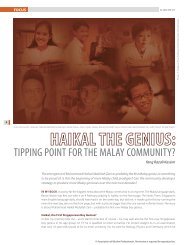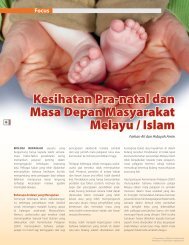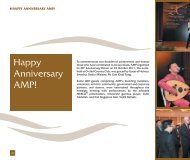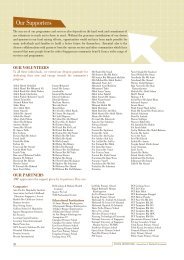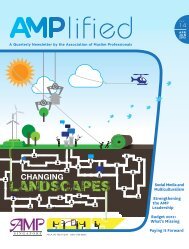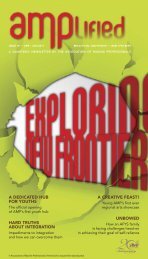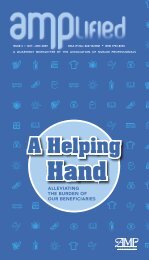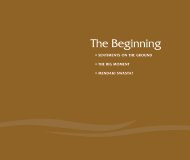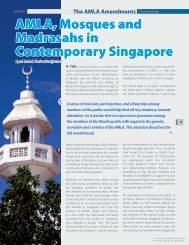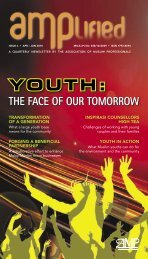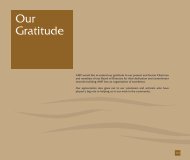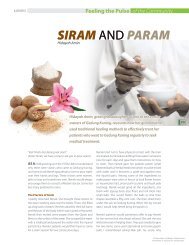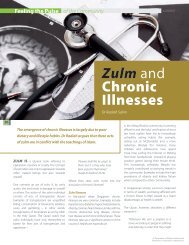community - Association of Muslim Professionals
community - Association of Muslim Professionals
community - Association of Muslim Professionals
You also want an ePaper? Increase the reach of your titles
YUMPU automatically turns print PDFs into web optimized ePapers that Google loves.
KARYAWAN<br />
COMMUNITY<br />
IN REVIEW<br />
had always been about ensuring the supposedly weak students remain in school, and about improving their<br />
performance in mathematics. ‘Upstream’ strategies on the other hand revolve around how the teachers’ beliefs<br />
and classroom practices (pedagogy) affect students’ performance. Therefore, fixing the leaking tap requires first<br />
the examination <strong>of</strong> the causal relation between teachers’ pedagogy and students’ outcome. This is based on the<br />
assumption that students’ performance is a direct function <strong>of</strong> the teachers’ pedagogy.<br />
Furthermore, it is plausible that the effectiveness <strong>of</strong> the ‘human agency’ approach and the utility <strong>of</strong> the<br />
‘downstream’ programmes have plateaued and therefore over time actually sustained the current trend in the<br />
performance <strong>of</strong> the Malay students in mathematics. This interpretation presents the opportunity to ponder<br />
other contributing factors beyond the ‘human agency’, such as the school’s eco-system, teacher training and<br />
beliefs, curriculum and pedagogy.<br />
As it stands, very little public attention within the <strong>community</strong> has been given to discussing the impact <strong>of</strong> the<br />
curriculum and pedagogy on the performance in mathematics <strong>of</strong> students from minority communities in a<br />
multicultural society. In studying the nexus between mathematics and culture, researchers such as Marilyn<br />
Frankenstein and Arthur Powell in their study <strong>of</strong> ethnomathematics, have explored the possibility that perhaps<br />
the teachers’ pedagogy and beliefs, which translate into the classroom practices in mathematics education<br />
have inadvertently led to the continued dismal performance<br />
As it stands, very little<br />
public attention within the<br />
<strong>community</strong> has been given<br />
to discussing the impact <strong>of</strong><br />
the curriculum and pedagogy<br />
on the performance in<br />
mathematics <strong>of</strong> students<br />
from minority communities<br />
in a multicultural society.<br />
<strong>of</strong> students from certain socio-cultural backgrounds. They<br />
opined that the teaching <strong>of</strong> mathematics in a multicultural<br />
society should be sensitive to the “impacts <strong>of</strong> various cultural<br />
conventions and inclinations – from daily activities and linguistic<br />
practice to one’s social and ideological context – for doing<br />
and learning mathematics.” This is because, mathematics as “a<br />
cultural product ... is created by humans in the interconnected<br />
midst <strong>of</strong> culture. The interactions are dialectical: people’s daily<br />
practice, language, and ideology effect and are effected by their<br />
mathematical knowledge”, according to these researchers.<br />
15<br />
In summary, the teaching <strong>of</strong> mathematics in schools in a multicultural society, should consider the intricacies<br />
and nuances <strong>of</strong> the students and teachers’ socio-cultural background. Otherwise, a socio-cultural disconnect,<br />
which hinders learning and obstruct the transfer <strong>of</strong> knowledge may be intepreted as a by-product <strong>of</strong> behavioural<br />
and cultural shortcomings on the part <strong>of</strong> the students and their parents.<br />
Other Factors<br />
All this is not to imply that the existing national curriculum isolates students from certain socio-economic and<br />
cultural background. In fact, it has been shown over the years that academic success can be attained regardless<br />
<strong>of</strong> one’s race and socio-economic background. However, sustained underperformance in mathematics at the<br />
national level despite decades <strong>of</strong> intervention at the <strong>community</strong> level does beget the question <strong>of</strong> whether the<br />
issue is more complicated than it appears in the mass imagination.<br />
It is on this note that two issues need to be highlighted. First, the public discussion within the <strong>community</strong> on<br />
the issue <strong>of</strong> mathematics performance amongst the Malay students has stagnated with almost no new insights.<br />
Second, there is perhaps the possibility that the teaching <strong>of</strong> mathematics in our schools, within the settings <strong>of</strong><br />
a multicultural society, has a far stronger correlation and causal link with the performance <strong>of</strong> Malay students<br />
in mathematics as opposed to the popular notions which merely highlights the lack <strong>of</strong> ‘human agency’ on the<br />
part <strong>of</strong> the students and their parents.<br />
Nur Azha Putra is a member <strong>of</strong> Young AMP’s Board <strong>of</strong> Management. He is also an Associate Research Fellow with the<br />
S. Rajaratnam School <strong>of</strong> International Studies (RSIS), Nanyang Technological University.<br />
© <strong>Association</strong> <strong>of</strong> <strong>Muslim</strong> Pr<strong>of</strong>essionals. Permission is required for reproduction.



